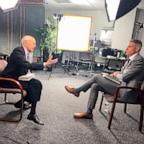Politicians Vow to Reform Mine Safety
Jan. 22, 2006 — -- It took two nearly two days to find the bodies of Don I. Bragg, 33, and Ellery Hatfield, 47, the miners who were unable to escape when a conveyor belt in the Aracoma Coal Alma No. 1 Mine caught fire in Melville, W. Va.
The deaths came just weeks after 12 miners died in an explosion in West Virginia's Sago Mine Jan. 2.
Now, several officials say they're tired of the danger and deaths, and want to do something about it -- fast.
Joe Rose, a miner who managed to survive, described the nightmarish conditions inside.
"It sounded like thunder coming through there, and I was engulfed in smoke," he said. "You couldn't see your hand in front of your face."
Sen. Jay Rockefeller, D-W.Va, who helped break the news to the families, is determined to make changes in mine safety.
"The grief is unbelievable and I don't think it's gonna be left alone in legislation," he said.
West Virginia Gov. Joe Manchin was blunter, and plans to introduce legislation Monday.
"This has got to stop," Manchin said. "It's going to stop, we're going to make changes."
Manchin isn't waiting for the federal government to act. He'll ask state lawmakers to provide more rapid response rescue teams, electronic tracking devices and more oxygen supplies within the mine.
"If I am able with every breath of my body, [I am going] to make sure that every brave miner, every brave worker in this state knows that we're going to do everything to make sure they're in the safest conditions humanly possible," he said.
"These two men who perished in this mine, the 12 men who perished in the Sago Mine, I can only say to each of those families … that they have not died in vain," Manchin added.
Rep. Nick Rahall, D-W.Va., told ABC's Kate Snow that "the status quo is unacceptable."
Snow asked why, in Australia, miners have three days worth of oxygen in reserve, but in America the miners only get one hour.
"The direct answer to your question [is] cost, financial reasons, expensive," Rahall said.
Changes, he added, would have to come from both the government and the mining industry.
"The government has responsibility here to step in and to ensure we are vigilant in our protection of the miners' health and safety," he said. "The industry, hardly able to cry poverty, has a responsibility as well."
Rahall said the industry should use "the same technology that has displaced the mine worker to help those who are currently working."
"And yes, better communications is definitely needed, tracking devices, whatever," he added. "If it's more expensive, so be it."




